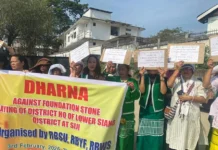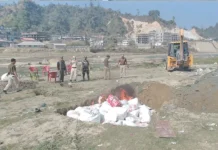YINGKIONG, 18 Aug: Sixty-one head gaon buras (HGBs) and gaon buras (GBs) from Yingkiong, Jengging, Pobe and Geku circles and Likor village in Palling circle participated in a reorientation programme organised here by the Upper Siang district administration on Monday.
The initiative was undertaken in accordance with the Assam Frontier (Administration of Justice) Regulation, 1945 and the Guidelines for Appointment of GBs, 2005, which clearly define the powers, duties, conduct, and responsibilities of HGBs and GBs.
The objective was to make the HGBs and GBs aware of the legal framework governing their appointment and conduct, as well as their pivotal role in village-level administration and justice delivery.
Addressing the participants, Deputy Commissioner Talo Jerang underscored the vital role of HGBs and GBs as frontline functionaries of the government at the village level. “HGBs and GBs are the most important village-level functionaries. It is essential that they understand their duties and responsibilities thoroughly, as they play a crucial role in maintaining law and order and supporting development initiatives in their respective jurisdictions,” he said.
Terming the orientation very crucial for the HGBs and GBs, the DC said that all HGBs and GBs must maintain absolute loyalty and integrity towards the government. He instructed them to promote and advocate government policies and instructions, and strictly refrain from participating in or supporting any agitation or movement against the government, or from criticizing government policies in public or on social media.
He warned that strict disciplinary action would be initiated against defaulters.
Geku Assistant Commissioner Aniyang Ratan conducted a session on the appointment, roles, and responsibilities of village authorities, highlighting the legal provisions, relevant government instructions, and dos and don’ts for GBs.
ADC (HQ) Natek Nonang and SDO Toni Mitkong spoke on the powers and functions of HGBs and GBs, elaborating their administrative and quasi-judicial responsibilities under the Assam Frontier (Administration of Justice) Regulation, 1945, and the Guidelines for Appointment of GBs, 2005.
Mariyang ADC Nongkong Borang conducted a session on kebang procedures and the role of HGBs and GBs under the Arunachal Pradesh Civil Courts Act, 2021, in conjunction with the AFR, 1945. He emphasized how traditional village forums, when conducted lawfully, complement the state’s justice delivery mechanism.
During the sessions, the participants were given orientation on understanding their roles, powers, functions and responsibilities.
As per Section 5(1) of the regulation, the deputy commissioner is the appointing and disciplinary authority for HGBs and GBs and is empowered to take disciplinary actions, including issuance of show cause notices, suspension, or dismissal for misconduct, negligence, disqualification, or unsatisfactory performance.
The HGBs and GBs, being public functionaries, are entrusted with maintaining peace and order, assisting in crime detection and reporting, supporting development programmes, acting as quasi-judicial authorities in civil and certain criminal matters under customary laws, and promoting government policies at the village level.
They are barred from political affiliations, prohibited from engaging in agitations against the government, and must maintain integrity and loyalty to the government while refraining from publicly criticizing government policies.
GBs are deemed public servants under Section 2(28) of the Bharatiya Nyaya Sanhita, 2023 while discharging official duties and are eligible for monthly honorarium (Rs 2,000 for HGBs and Rs 1,500 for GBs).
The district administration emphasized that all HGBs and GBs must scrupulously follow the provisions of the regulation and uphold the dignity of their posts by performing their duties with honesty, discipline, and commitment.
Any deviation or involvement in anti-government activities, including making critical statements on public platforms or social media, will invite strict disciplinary action.
The training programme marked a critical step in strengthening the traditional village institution while aligning it with constitutional governance and public accountability. (DIPRO)



